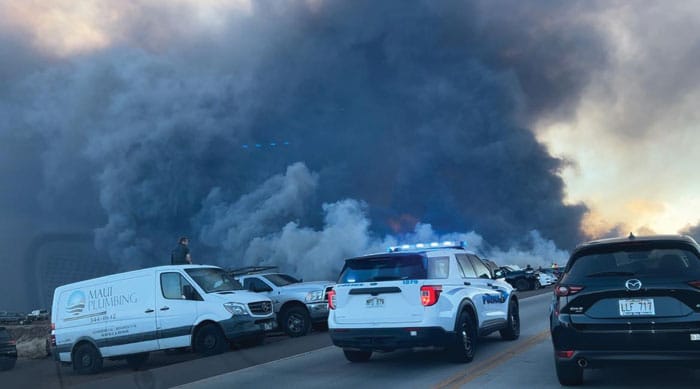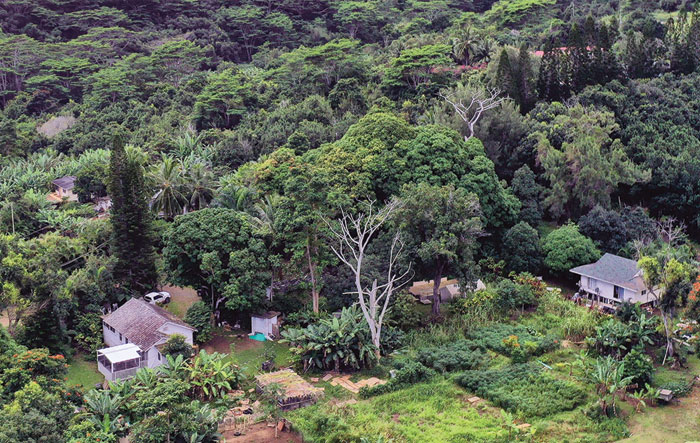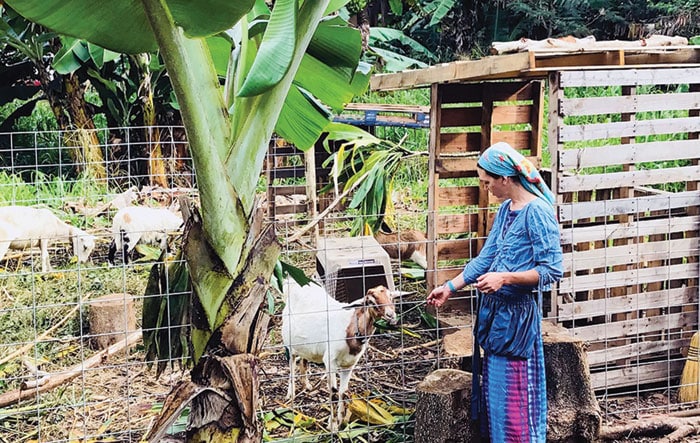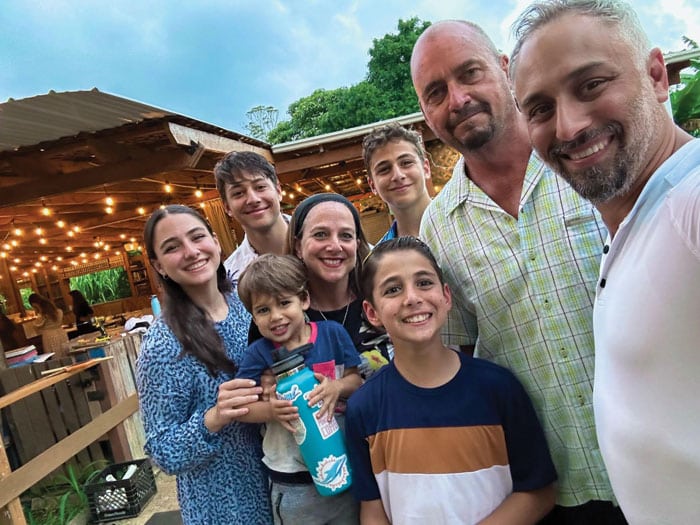 View of the fire from the Androns’ car on the upper Lahaina bypass.
Photo courtesy Ben Andron
View of the fire from the Androns’ car on the upper Lahaina bypass.
Photo courtesy Ben Andron I want to tell you about the Maui Kosher Farm.
Tucked away in the woods in Wailuka are eight acres of farmland, with Hawaiian tallgrass growing, hand-dug streams and waterfalls running through fields, sectioned off by fencing made of wooden pallets. On this property is everything you might expect to find on a Hawaiian farm; pineapple patches, papaya and banana trees, macadamia groves, goats, sheep, beehives, chickens … and also a Mikvah, and an outdoor dining hall/library/synagogue lovingly referred to as “the Mishkan.”
None of this was here six years ago when Rabbi Mendel Zirkind and his wife Chana made this place home. Their mission was to create a Jewish anchor in a region devoid of one: to provide kosher food to locals and tourists who need it, to help the largely unaffiliated Jews of Maui get closer to their roots and to help Jews from all over connect to the land in this beautiful paradise.
Getting to the Maui Kosher Farm isn’t easy. According to Mendel’s text, “we’re right after the 10th speed bump on Malaihi Rd. If you don’t count the speed bumps and follow GPS you will get lost in the mountains.”
Getting to the Maui Kosher Farm isn’t easy. According to Mendel’s text “we’re right after the 10th speed bump on Malaihi Rd. If you don’t count the speed bumps and follow GPS you will get lost in the mountains.” This is followed by a hand-drawn pic labeled “imaginary map,” with a green-dotted line marking the path … Is this guy for real??

August 7th, the first day of what was supposed to be a four-day trip to Maui. While strolling down Front Street in Lahaina, affectionately referred to as “the heart of Maui,” we passed quaint shops (one of which, we noticed, had a mezuzah on the door), art galleries, had pineapple by the famous Banyan tree and took pictures of our five children by the sea wall … Twenty-four hours later, there would be a very different picture happening at that wall
Tuesday, August 8th, we woke up in our beautiful Ka’anapali villa (just a few miles north of Lahaina) to find the power out and the most intense wind pounding against the windows. Mendel’s area still had power so we went ahead as planned, thinking by the time we got back, the power would be back on. That’s not how it played out.
Traffic was very intense with road closures and detours … We lost count of how many downed power lines we passed. But the further we went, the calmer the weather. After counting the speed bumps, following the imaginary green line and arriving at the gate marked “Bruchim Habaim” in Hebrew, it felt like we were in another world. We were greeted by Chana, flanked by two dogs (Matzah Ball and Noodle), and a dozen teen girls from all over the U.S. on a summer program.
Simply put, Chana is a rock. Gliding effortlessly around the farm in her socks and tichel hair covering, this is someone who seems completely unshakeable. For the next two hours, she juggled running a camp, giving a tour, preparing lunch for 40 people featuring her incredible homemade focaccia sourdough bread, and not once did she seem frazzled or overwhelmed. Unbeknownst to any of us at the time, over the next few days the number of people needing food would double, and she would add housing refugees and comforting survivors to that list. And still: A rock.
Mendel sat with us for a bit and told us his story. Even as a child in Israel, he was fascinated by the connection between our Forefathers and farming. He dreamt of working the land, and creating a place where Jews can experience that connection for themselves.
As we said goodbye, Mendel told us that if the power is still out, we should just come back here. “We’ve got plenty of tents.” We politely laughed and said “you never know…” then set off, not really expecting to see them again.
A few hours later, we were at a standstill on the Honoapi’ilani Highway heading into Lahaina. There was still no power, but more importantly, no cell service or GPS. The wind had gotten even worse since the morning. And then there were the huge black clouds ahead. We have brush fires in Southern California, but I’ve never seen clouds like that before. We probably should’ve turned around right then, but traffic kept creeping along, and there were a few people walking along the road. We even saw a guy on a bicycle heading into town, toward the smoke. So it must look worse than it is.
They closed off the road and diverted us to the upper Lahaina bypass highway, where we were told to park and wait for the road to open. You could tell right away that something wasn’t right, but with no cell service, we were completely in the dark. When I got out of the car to get information, you could barely stand up from the wind, and the sand pelted your skin like thousands of tiny knives. We tried to look for subtle changes of color in the smoke, or any other sign of it letting up. I could see the flames getting closer but we assumed that if the area wasn’t safe, the police would tell us to move.

We had no idea that just a kilometer away, Derek “Zisha” Miller, a Lahaina resident who had been reconnecting with his Jewish roots on the farm every Shabbat, was fighting for his life. When the gas station exploded near his home, he took off and — with some Herculean efforts along the way — drove to a coffee shop where five people were taking shelter. With pitch black smoke descending and breathing becoming more difficult, he knew none of them would survive there, and managed to get the others out to a nearby rescue vehicle. When he got into his truck to follow them, the steering wheel was melting from the heat. With seconds to spare, he jumped into the rescue. He got out with his life, but would be left with nothing; his home and business did not survive.
We considered leaving, but with thousands of cars behind us, leaving meant no chance of getting back to the hotel, and nowhere else to go. Of course, the roads wouldn’t be opening at all, but we didn’t know that. None of us had a real understanding of what was happening, including the police. They just told us to just stay put and wait. There were no sirens, no announcements, no “evacuate the area and seek shelter immediately.” Even smelling the smoke, and seeing the flames, you just assume it’s a brush fire near the town. You can’t imagine that it’s actually the town on fire, or that historic Front Street simply isn’t there anymore…
It wasn’t until we’d been sitting there for hours and I told the officer I had little kids in the car that he advised us to go back to the central part of the island, get the kids fed, and find shelter for the night. A mile or two back down the road, our phones got one bar (finally!), so we pulled over to figure out next steps. There were no hotels available anywhere. I never would have imagined our family of seven spending the night in the car, but that reality was sinking in fast.
Getting out of the area, passing miles of cars parked on the highway, we went to Target to grab a few essentials; socks, underwear, toothbrushes, a change of clothing … It was a madhouse. You kept hearing “I’m sleeping in my car tonight.” “I can’t find a hotel.” “I’m going to the airport to try and get out.” We met one family that was splitting up, the mom and kids flying out while the dad stayed behind to try and get their things. For us, there was only one option. Twenty minutes later, with nothing but a few Target bags in hand, we were back on the Maui Kosher Farm.
We weren’t the only ones. The farm was bustling with activity as more refugees trickled in and the girls scrambled to get everyone situated. Couples in a few of the bungalow shacks (hand built by Mendel), singles in tents, a few Lahaina residents who’d lost their homes sleeping on the couches in the Mishkan … We were in the “banana bungalow,” the only option big enough to accommodate our family of 7, though it meant displacing the counselors for the summer program (which they were happy to do).
It was a strange few days trying to figure out next steps. The tourists all had similar stories. “Couldn’t get back to the resort.” “Don’t have any of our things.” “Can’t get through to the hotel …” At that point, they had not even reported the initial “six confirmed deaths,” and certainly not the numbers that would surface in the coming days, so getting “our stuff” still felt like a high priority.
Mendel, a former chef, usually prepares dinner. But Wednesday night, as traffic on the farm was at its highest, he was going to Lahaina with a police escort while Chana and the girls (with my wife Michelle and daughter Sarah jumping in for the assist) scrambled to prepare dinner for over 75 people. As clergy, Mendel got special permission to enter as part of the relief effort. He texted saying he would try to go to our resort and get our essentials. I told him where our tefillin were, laptops, and a few other essentials … We had no idea when he’d be back, as there was still no cell service in that area.
I woke just before sunrise Thursday and saw his text (sent at 4:27 a.m.): “All of your villa was packed up and brought to the Mishkan.” That can’t possibly be right … We’re a family of seven, in a three-bedroom villa, with stuff everywhere. We even threw a load of laundry into the washing machine Monday night. There’s no way he could have packed everything, by himself, in the dark. I threw on some flip-flops and quietly hurried down the dirt paths between the fields to the Mishkan, not wanting to wake anyone but needing to see for myself.
Everything was there. Not only our things, but other couples staying in the same resort. Piles of suitcases, garbage bags full of odds and ends, backpacks … Everything.
We were in a state of shock. Moments later, all of us were in the Mishkan finding our belongings, going through bags, locating the essentials. The joy and relief was palpable; praying with our own tefillin that morning, in what was once again a paradise, was the most spiritually uplifting experience I’ve had in a very long time.
Rabbi Mendel had done something worthy of immense gratitude, and instead of feeling beholden, he made it seem like we gave him something fun to do.
When I saw Mendel later that morning, I rushed over to effusively thank him, expecting him to be exhausted. But the crazy thing — he was just as energetic and excited as I was. The twinkle in his eye as he described the adventure of finding and getting into the villa in the dark, going through with a flashlight and leaving no stone unturned … it was like a kid describing a fun scavenger hunt he’d been on. This is a true tzadik; he had done something worthy of immense gratitude, and instead of feeling beholden, he made it seem like we gave him something fun to do.
He never let on that at the same time, he was desperately trying to find Zisha, who had been taken to one of the shelters, still with no cell service, bearing witness to unimaginable horrors from his cot directly next to the burn triage. Or that Karina, along with her husband and three beautiful little girls, who also lost her home and Front Street boutique (“the one with the mezuzah” she would later tell us), had already been on the farm for two days but was so traumatized that she wouldn’t come out of her tent.
This spirit of selfless giving is one of the defining characteristics of the Zirkinds. Mendel would later explain that when you give of yourself, the reward is that you are able to give even more. And especially in the face of this tragedy, where so many need so much, his faith that whole-hearted giving would provide nothing but added blessing was unshakable.
As the week drew to a close, the overall vibe on the farm shifted. Many of the tourist refugees had already gotten off Maui, but we couldn’t get a flight that would get us home before Shabbat. Mendel finally located Zisha after he had been moved to another shelter and brought him to the farm Thursday night. We had gotten plenty of help throughout the week, now it was our turn. Michelle and Sarah spent Thursday and Friday helping prepare for Shabbat. Two of my sons helped assemble a wagon and a bench swing that Mendel wouldn’t have time to get to for a long while. We relocated quail and chicken cages that were stinking up the central walkway. Anything we could do to be a useful pair of hands …
Or ears. Zisha was in shock, but I sat with him late into the night on Thursday when he started to share. He told me about the people leaping over the sea wall to escape the flames in the water, many of whom did not survive. He told me about helping mothers get to safety, unable to find their children. He told me about the guy on the bicycle we’d seen riding into town that day, and how he met his end.
When the warmth of Shabbat finally descended, the candle lighting and singing in the Mishkan brought a peace we so desperately needed … Locals and tourists, refugees and visitors, we each experienced it differently, but were all part of it together.
When the warmth of Shabbat finally descended, the candle lighting and singing in the Mishkan brought a peace we so desperately needed. Everyone — including Zisha and Katrina — came and ate, and cried, and laughed together with such a sense of unity … Locals and tourists, refugees and visitors, we each experienced it differently, but were all part of it together.

Photo courtesy Ben Andron
In the face of tragedy, we often ask why. And we come to realize that as much as we plan, we are not in control. I don’t know why we had to go through this, or why we needed to be on that farm during this incredible time, but sitting together around the table long after the sun went down Saturday night making us “the last people in the world keeping Shabbat” as Reb Mendel happily pointed out, I felt in every fiber of my being that we were exactly where we were supposed to be.
Twenty-four hours later we would be safely back in our home in Los Angeles, but we will always carry a piece of the Maui Kosher Farm in our hearts.
To donate to help the Maui Jewish community affected by the fire, visit https://www.mauikosherfarm.com/fire.
Ben Andron is a writer/producer of entertainment advertising in Los Angeles, where he lives with his wife and 5 children.






















 More news and opinions than at a Shabbat dinner, right in your inbox.
More news and opinions than at a Shabbat dinner, right in your inbox.